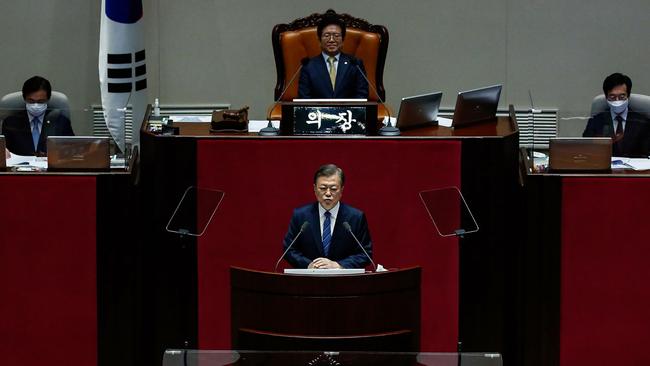Fossil fuel exports to feel squeeze as South Korea makes carbon neutral pledge
South Korea, one of Australia’s biggest coal and LNG buyers, has pledged to become carbon neutral by 2050.

One of Australia’s biggest coal and LNG buyers has pledged to become carbon neutral by 2050, with South Korea joining Japan and China in a major climate shift that is set to slash demand for Australian commodity exports.
Korean President Moon Jae-in said the aim of net-zero emissions target would see South Korea move from coal power generation to renewables, with a focus on building new markets and industries during the transition.
South Korea is Australia’s fourth-largest market for metallurgical coal, thermal coal and LNG, and accounted for $11.4bn for those three commodities in 2019, according to government figures, while Australia is Korea’s second largest supplier of LNG.
The declaration now means three of Australia’s biggest buyers of fossil fuels plan to accelerate efforts to combat climate change, after Japan set the same carbon-neutral target for 2050 and China, the world’s No 1 polluter, committed to net-zero emissions by 2060.
“This is disastrous for Australia,” said Bruce Robertson, an analyst for the Institute for Energy Economics and Financial Analysis. “Two of our country’s major export industries are going from growth to decline. It’s the biggest structural change in modern Australian economic history.
“It’s time to wake up and listen to our major export customers.”
Moves by South Korea, Japan and China to pursue carbon-neutral status has raised questions over the long-term outlook for Australia’s commodity exports.
“This announcement will likely send further shockwaves through the coal export industry,” Bloomberg NEF’s global head of special projects, Kobad Bhavnagri, tweeted after Japan made its pledge earlier this week.
“Australian coal is quickly being left with nowhere to go. Japan is Australia’s biggest trading partner in coal. They have just served us divorce papers.”
NSW Energy and Environment Minister Matt Kean, who has warned of the danger that gas projects such as Narrabri could become stranded assets, said Australia was well placed to assist Asian nations in the transition.
“Just today, South Korea has followed Japan and committed to #NetZero. They will need help to get there and we are better placed than anybody to provide the renewables and hydrogen to assist,” Mr Kean tweeted.
“That means jobs, industry and opportunity.”
Consultancy Wood Mackenzie said Australia may not be hit to the same extent as other exporters, with some Japanese contracts in place until 2040.
Japan’s “net-zero goal will accelerate the decline post-2030. However, Australia would be less affected than other exporters to Japan due to its locational advantage, existing long-term contracts, right quality and competitive costs,” WoodMac research director Prakash Sharma said.
Australia, the world’s biggest LNG exporter, also holds long-term gas contracts with Japan that may shield any medium-term impact. “Australian LNG exports to Japan have actually ramped up in the past couple of years and this will continue to be delivered under long-term contract through to the mid-2030s with a portion of this still under long-term contract in 2040,” WoodMac principal analyst Lucy Cullen said.
Carbon neutrality would be difficult for Japan and even more challenging for South Korea, consultancy EnergyQuest said.
“As with Japan, the most obvious route to a cleaner fuel mix would be via nuclear but that is not popular,” EnergyQuest chief executive Graeme Bethune said.
He said South Korea’s small renewables share “would need to increase a lot, but as with Japan there is limited scope”.
The UN praised the South Korean plan, which will spend $US7bn ($9.8bn) on green growth, although it faces challenges to overhaul its reliance on fossil fuels.
Coal and gas account for two thirds of the country’s power output, with renewables providing just 7 per cent of its electricity needs currently.
Under the country’s Green New Deal, Seoul plans to invest $US46bn in clean energy by 2030 in a bid to reach a 20 per cent target by 2030.




To join the conversation, please log in. Don't have an account? Register
Join the conversation, you are commenting as Logout